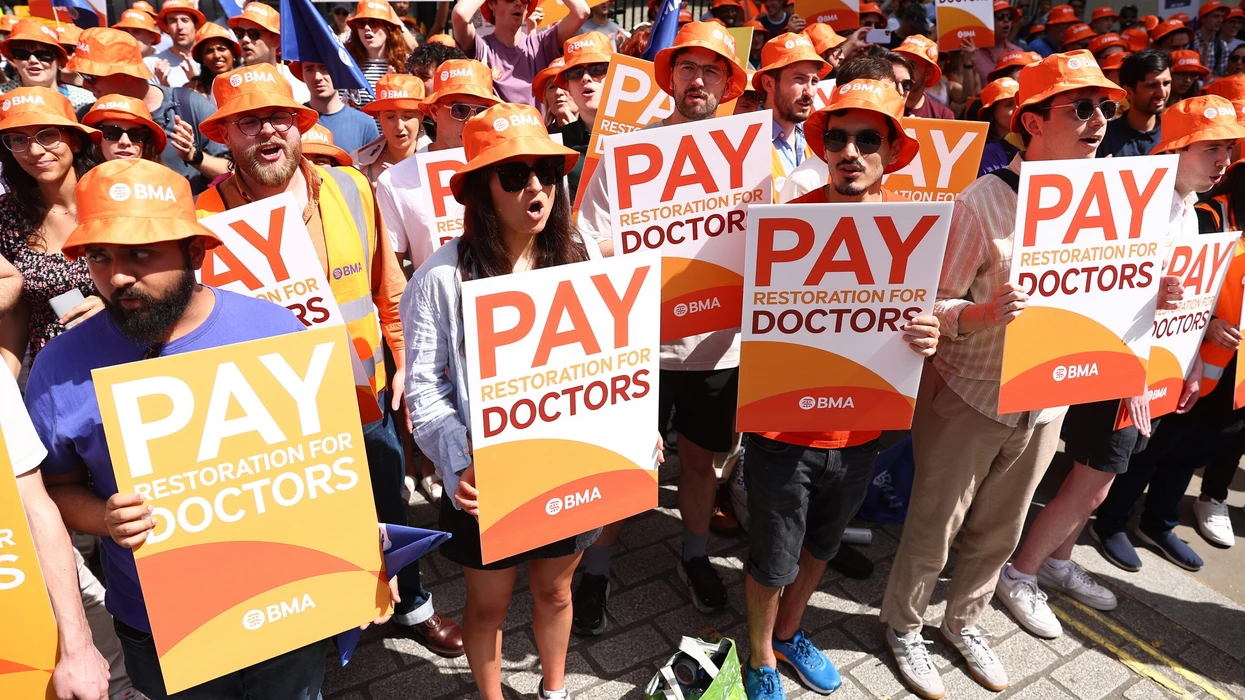As the NHS continues to reel under pressure, a major storm is brewing over pay disputes, and it’s not just another brief disagreement.
Resident doctors are gearing up for what could be a long and bitter battle with the government, and they’re coming prepared—very prepared.
£1 Million Reserved to Back Prolonged Industrial Action
The British Medical Association (BMA) has reportedly set aside a substantial £1 million fund exclusively for industrial action.
This money, referred to internally as the industrial action reserve, is designated to support resident doctors (formerly known as junior doctors) in their push for a 29% pay hike.
But that’s not all—the union has access to additional reserves exceeding £50 million if the need for extended strike action arises.
Documents reviewed by the Mail indicate that these funds are part of a broader strategy to apply sustained pressure on the government.
Talks with Health Secretary Wes Streeting haven’t made much headway, and unless a breakthrough happens soon, a five-day walkout is scheduled to begin at 7 a.m. this Friday.
Political Backlash Heats Up Over Labour and Union Ties
The growing financial arsenal of the BMA has reignited political debate.
Conservative figures are slamming Labour for what they see as an overly cozy relationship with unions.
Tory business spokesperson Andrew Griffith accused Labour of bending over backwards to satisfy their union “paymasters” and warned that the situation was spiraling out of control.
Former Tory leader Sir Iain Duncan Smith echoed these sentiments, warning that the country could soon see a return to the kind of union-dominated disruption last seen in the 1970s.
“They’re getting their payback by being allowed to run riot,” he said.
“We’re heading toward chaos if this isn’t addressed.”
Wes Streeting Struggles to Keep Negotiations on Track
Although Health Secretary Wes Streeting has labeled the upcoming strike action as “unconscionable,” he is still holding out hope for a resolution.
Last week’s talks were described as “constructive,” but the BMA insists that the chances of reaching a deal remain slim.
In a move aimed at easing tensions, Streeting has pledged to prioritize British doctors over international candidates in NHS job placements.
But whether this gesture will be enough to delay or cancel the upcoming walkout remains to be seen.
Wider Unrest Across Public Services Raises Alarm
The doctors’ strike is just one part of a wider wave of public sector unrest.
In Birmingham, bin workers are already deep into a prolonged strike that could last well beyond the summer.
Meanwhile, teachers are considering their own walkouts, and hospital consultants are hinting they might join the resident doctors on the picket lines.
The BMA is also demanding a 35% raise for these senior consultants.
With multiple professions considering strike action at the same time, fears of a disruptive “summer of discontent” are intensifying.
Strikes Linked to Patient Deaths and Health Service Disruption
The impact on the health service could be severe.
Previous rounds of strikes in 2023 and 2024 were linked to the deaths of at least five patients, and with approximately 70,000 resident doctors employed by the NHS, a prolonged standoff could leave millions of patients in limbo.
Tory heavyweight Jeremy Hunt, who served as Health Secretary between 2012 and 2018, criticized the current strike plans, calling them “totally ridiculous” in light of the 22% pay rise doctors reportedly received last year.
BMA Defends Its Financial Strategy Amid Criticism
In response to the backlash, a BMA spokesperson emphasized that the industrial action reserve has been in place for years and is specifically meant to support strike-related expenses such as covering lost pay for doctors.
The union also clarified that the £50 million in “other reserves” belongs to the broader BMA Group and isn’t exclusively earmarked for strikes.
Nevertheless, the size and timing of these funds have raised eyebrows and added fuel to the political firestorm surrounding the issue.
Doctors See Biggest Pay Bump in Nearly a Decade
Interestingly, data from the Office for National Statistics (ONS) shows that doctors have seen the largest pay increases of any profession since 2017.
According to the ONS, the average advertised salary for a doctor rose from £52,000 in January 2017 to £99,500 by May 2025.
That’s a staggering 91% increase—41% when adjusted for inflation.
These numbers may challenge the narrative that doctors are being underpaid.
In contrast, other professions like pilots, project managers, and IT technicians have seen far more modest salary growth, with some even taking a hit in real terms.
Public Opinion Remains Divided Over Walkouts
Despite the intensity of the BMA’s campaign, public support for striking doctors appears to be waning.
A recent YouGov poll found that only one-third of Britons support the upcoming strike action, while nearly half are opposed.
The numbers suggest that while many sympathize with the challenges doctors face, the appetite for prolonged disruption is limited.
What Comes Next?
All eyes are now on the next few days.
If no agreement is reached, Friday’s strike could mark the beginning of a protracted showdown between the BMA and the government—with patients stuck in the middle.
While the union says it’s ready for the long haul, the question is whether the government—and the public—are too.
